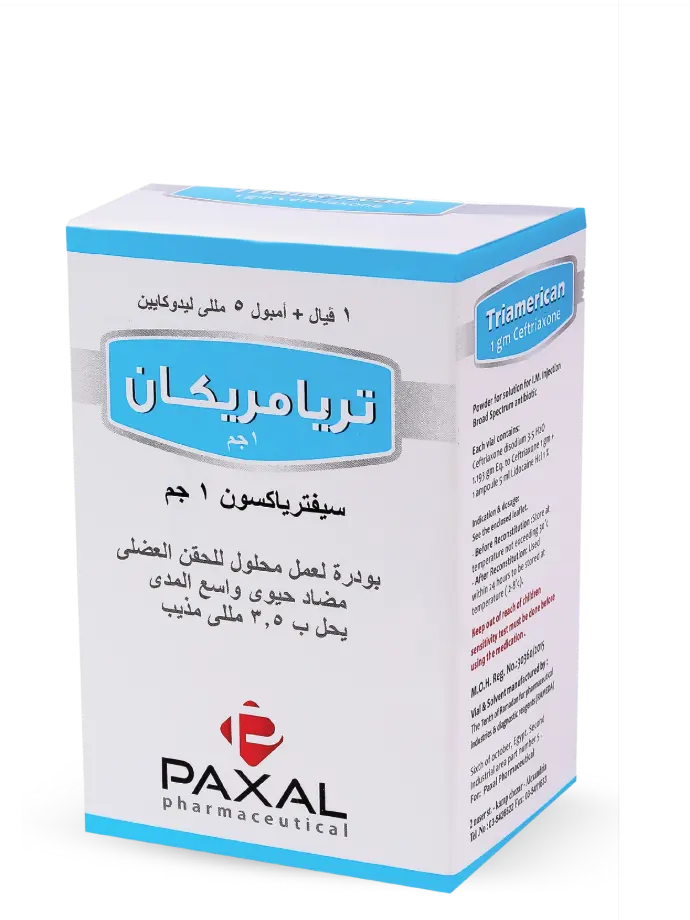
Triamerican
1g
Product Classification
Type: Broad-spectrum antibiotic.
Drug Category: Beta-lactam antibiotic (Cephalosporin).
Therapeutic Class: Anti-infective / Antibacterial.
Active Ingredient and Composition
Ceftriaxone Sodium equivalent to 1 g Ceftriaxone.
Formulation: Sterile powder for solution (intravenous or intramuscular injection).
Excipients: Pharmaceutical-grade stabilizers (as per pharmacopeia standards).
Mechanism of Action
Ceftriaxone is a third-generation cephalosporin antibiotic.
Inhibits bacterial cell wall synthesis by binding to penicillin-binding proteins (PBPs).
Results in bactericidal effect against both Gram-positive and Gram-negative bacteria.
Stable against many beta-lactamases, providing broad coverage.
Indications and Benefits
Primary Uses: Treatment of moderate to severe bacterial infections, including:
Respiratory tract infections (pneumonia, bronchitis).
ENT infections (otitis media, sinusitis, tonsillitis).
Urinary tract infections (UTIs).
Skin and soft tissue infections.
Bone and joint infections.
Abdominal infections (peritonitis, biliary tract infections).
Septicemia and meningitis.
Gonorrhea (single-dose treatment).
Surgical Prophylaxis: Pre-operative prevention of infections.
Dosage and Administration
(Must be prescribed and supervised by a healthcare professional)
Adults & children >12 years: 1–2 g once daily, or divided into two doses.
Severe infections: Up to 4 g daily.
Children <12 years: 20–80 mg/kg daily, depending on infection severity.
Neonates: Max 50 mg/kg/day (avoid calcium-containing solutions).
Route of Administration: IV infusion, slow IV injection, or deep IM injection.
Duration: Based on infection type and severity (usually 4–14 days).
Contraindications and Warnings
Hypersensitivity to ceftriaxone, other cephalosporins, or beta-lactams.
Contraindicated in neonates requiring calcium treatment (risk of precipitation).
Use with caution in patients with history of severe penicillin allergy.
Monitor in patients with renal or hepatic impairment.
Avoid alcohol during therapy (risk of disulfiram-like reaction).
Pregnancy & Breastfeeding: Use only if benefits outweigh risks; consult physician.
Possible Side Effects
Common: Pain at injection site, rash, diarrhea.
Uncommon: Nausea, vomiting, dizziness, candidiasis.
Rare but serious: Severe allergic reactions, pseudomembranous colitis, hematologic changes (anemia, leukopenia, thrombocytopenia).
Packaging and Presentation
Triamerican 1 g Vial: Sterile glass vial containing powder for reconstitution.
Supplied in cartons with patient information leaflet.
Pack sizes: single vial or hospital packs (5–10 vials).
Storage and Shelf-Life
Store below 25 °C, protected from light and moisture.
Reconstituted solution should be used within recommended time (usually 6–24 hours depending on solvent).
Shelf life: 24–36 months (unopened vials).
Manufacturer and Brand
Manufacturer: Paxal Pharma, Egypt (GMP-certified).
Distributor/Marketer: Paxal Pharma.
Brand Positioning: Reliable broad-spectrum injectable antibiotic trusted by hospitals and physicians.
Unique Selling Points (USPs)
High efficacy broad-spectrum coverage against major Gram-positive and Gram-negative pathogens.
Convenient once-daily dosing for many infections.
Trusted hospital antibiotic widely used in critical care and emergency settings.
Available in multiple strengths (including 500 mg and 1 g) for tailored therapy.
Cost-effective alternative without compromising on quality.